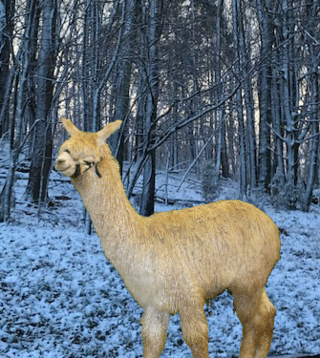Friday, January 13, 2023
Winter Electrolytes!

>Winter coats
>Water heaters
>Shelters
>Electrolytes
Am I suggesting electrolytes in the winter? Yes, I am. Here in TN, we experienced the coldest temperatures in 30 years. All I wanted was hot coffee or hot chocolate to drink after coming in from the barn. Probably by now you have seen articles about providing electrolytes to horses in the winter or warm water to your cattle, but have you thought about your alpaca or other small ruminants? Do you know how much they are drinking during the cold months of your region? If the temperature drops, your alpaca’s water consumption should not. Their daily requirement does not change with cooler temperatures. Wintertime water intake should actually increase.
Water plays an important roles in hydration, digestion, body temperature, nutrient transfer, hormone balance, and the important process of moving waste out of the body. Without enough water, one or all these important bodily functions will begin to decline. Let’s not forget to mention the effect of dehydration on our pregnant females and their developing fetuses. The stress of dehydration may be a contributing factor to some pregnancy losses.
Animals need a steady supply of clean water. Alpacas drink between 2-5 gallons per day. During the winter, they do not drink as much as they need. Winter dehydration affects the overall health of the animal and can cause lasting organ damage. Dehydration can increase the risk of choke, heart arrhythmia, kidney issues, constipation, and intestinal blockage/obstruction. Alpacas prone to constipation and bowel obstructions must have increased water consumption with increased dry winter diet. These conditions may be exacerbated in seniors and pregnant females.
Electrolytes encourage water intake which hydrates and balances the animal’s body. Electrolytes act as a stimulate to drink more due to the salt & mineral content. You do not want to provide electrolytes that are predominantly sugar. Check the ingredient label and look for products that contain salt and minerals (sodium, potassium, magnesium, calcium) over sugar or sugar substitutes. Always keep plain water available even when electrolytes are offered.
Even though it is not hot outside, the risk of dehydration is great in the winter months. Encourage increased water consumption during the winter months with electrolytes when your alpaca’s diet is predominantly hay and dry forage. Hay is typically less than 10% water compared to green grass/pasture that is usually over 50% water. When feeding hay, our animals get ALL their water from drinking. In addition, animals don’t like to drink very cold water, increase water consumption by keeping water temperature well above freezing. Average temperature suggested is between 50 - 70 degrees F. Prevent water from freezing with heaters or auto waterers with thermostats. Make sure that water buckets or drop in heaters are in good working condition to ensure animals will not experience a shock when drinking which will further deter them from drinking.
Water is important for good health and survival for animals and humans. Winter dehydration can often go unnoticed in our alpacas until a medical emergency arises. Preemptively offering electrolytes during cold months may help maintain health. The cost of electrolytes is minimal compared to a veterinarian exam and emergency treatment. Winter takes a toll on not only our animals but their caretakers as well. Create a seasonal worklist that includes electrolytes in winter to maintain a healthy farm.